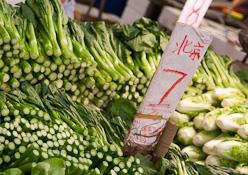
The decreasing value of the Hong Kong dollar relative to the currencies of its major trading partners caused the price of fruit and vegetables to rise 16.8 and 7.5 per cent respectively between 2009 and 2010.
According to a Global Agricultural Information Network (GAIN) report by the USDA the depreciation has impacted the market share of various countries exporting to Hong Kong, with the US the main benefactor.
Hong Kong’s market share of US agricultural and food products increased from 14 to 17 percent, representing a remarkable jump of 39 percent between 2009 and 2010. This was in part due to a stable exchange rate between the two countries with the Hong Kong dollar pegged at US$7.78, suggested the report.
This made US products more attractive to Hong Kong buyers with the country's dollar devalued relative to most other supplier countries. Subsequently imports of US fruits rose by 31 per cent, while the market share of products from countries such as China, Brazil, Thailand and Australia declined.
According to the report Australia’s currency appreciated by 8 per cent relative to the Hong Kong dollar between 2009 and 2010, while its fruit exports dropped by a whopping 36 per cent.
South Africa proved an exception with the volume of its fruit exports to Hong Kong increasing by 32 per cent. The report attributed this increase to South African grape exports taking market share away from Chile.






No comments yet